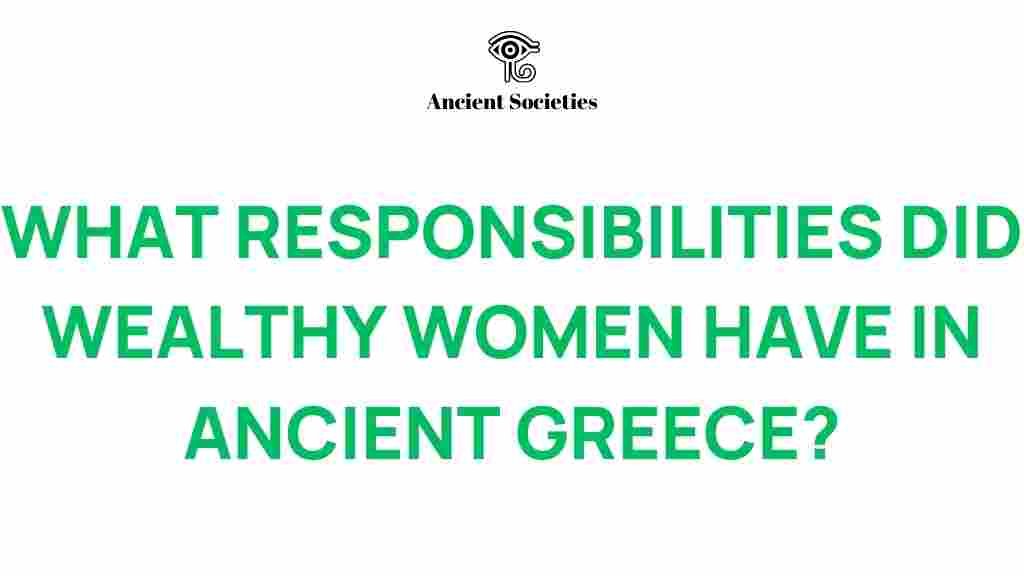Unveiling the Hidden Roles of Wealthy Women in Ancient Greece
Ancient Greece is often depicted as a male-dominated society, where men held the reins of power, politics, and public life. However, the roles of wealthy women in Ancient Greece reveal a more complex narrative. These women, often overlooked in historical accounts, played significant roles in their families, communities, and even the broader economic landscape. This article explores the societal roles, gender dynamics, and cultural influence of wealthy women in Ancient Greece, shedding light on their contributions to family responsibilities, economic contributions, and the overall tapestry of history.
The Societal Roles of Wealthy Women in Ancient Greece
The societal roles of wealthy women in Ancient Greece were multifaceted and varied significantly across city-states. While women in Athens were often confined to their homes, women in Sparta enjoyed a relatively freer lifestyle. Here are some key roles they played:
- Family Caretakers: Wealthy women were primarily responsible for managing the household. They oversaw the education of their children and the training of servants.
- Social Influencers: Women hosted gatherings and events that allowed them to exert social influence and create networks within their communities.
- Religious Leaders: Many wealthy women served as priestesses in various cults, playing important roles in religious ceremonies and rituals.
- Economic Contributors: Women managed household finances and could own property, which allowed them to contribute economically.
Gender Dynamics in Ancient Greece
The gender dynamics of Ancient Greece were complex and often contradictory. While the general perception was that women were subservient to men, wealthy women wielded a form of power that was subtle yet impactful. Here’s how gender dynamics played out:
- Patriarchy and Power: Despite the patriarchal structure, wealthy women could influence decisions through their family connections and social standings.
- Education and Literacy: Some wealthy women received education, which enabled them to engage in intellectual discussions and contribute to cultural life.
- Legal Rights: In certain contexts, wealthy women had legal rights to inherit property, which was unusual in many societies.
Historical Context of Female Empowerment
The concept of female empowerment in Ancient Greece can be seen through the lenses of various women who defied societal norms. Figures like Aspasia of Miletus, who was known for her intellect and influence, showcased how wealthy women could navigate and challenge the prevailing gender norms. Their empowerment often stemmed from their wealth and social status, allowing them to carve out spaces for themselves in a largely patriarchal society.
Cultural Influence of Wealthy Women
Wealthy women in Ancient Greece significantly influenced culture and society. Their involvement in religious practices, arts, and education contributed to a rich cultural tapestry. Here are some ways they left their mark:
- Patrons of the Arts: Many wealthy women sponsored artists, playwrights, and philosophers, thus shaping the cultural landscape.
- Role in Festivals: Women played crucial roles in religious festivals, which were central to Greek culture, thus reinforcing their presence in public life.
- Intellectual Contributions: Through their salons and gatherings, wealthy women facilitated intellectual discourse, promoting literacy and education among both genders.
Family Responsibilities of Wealthy Women
Family responsibilities were central to the lives of wealthy women in Ancient Greece. Their roles extended beyond mere caretaking; they were the backbone of their households. Here’s a closer look:
- Child Rearing: Women educated their children, especially daughters, in domestic arts, preparing them for future family roles.
- Household Management: They managed the household staff and resources, ensuring the family’s economic stability.
- Marriage Arrangements: Wealthy women often negotiated marriages, which were critical for forming alliances between families.
Economic Contributions of Wealthy Women
Contrary to the notion that women were entirely dependent on their male counterparts, wealthy women in Ancient Greece made significant economic contributions. Here’s how:
- Property Ownership: Wealthy women could own property, manage estates, and sometimes even engage in business activities.
- Dowries: The dowries provided by wealthy families were crucial for securing advantageous marriages and often included substantial assets.
- Investment in Agriculture: Many women were involved in agricultural investments, contributing to the economy of their city-states.
Step-by-Step Process to Understanding the Roles of Wealthy Women
To fully appreciate the roles of wealthy women in Ancient Greece, consider the following steps:
- Research Historical Texts: Look into ancient texts, such as those by Aristotle or Plutarch, that reference women and their societal roles.
- Examine Archaeological Evidence: Artifacts such as inscriptions and pottery can provide insights into the lives of these women.
- Explore Comparative Analysis: Compare the roles of women in different city-states, such as Athens and Sparta, to understand the diversity of experiences.
- Engage with Modern Scholarship: Read contemporary analyses and interpretations that explore the complexities of gender dynamics in Ancient Greece.
Troubleshooting Common Misconceptions
Many misconceptions surround the roles of wealthy women in Ancient Greece. Here are some common misunderstandings and clarifications:
- Myth: Women Were Completely Oppressed: While there were restrictions, wealthy women often had a level of influence and power that contradicts this view.
- Myth: All Women Were Ignorant: Many wealthy women were educated and engaged in intellectual pursuits, contrary to the stereotype of ignorance.
- Myth: Economic Contributions Were Minimal: Wealthy women played crucial roles in managing estates and contributing to the economy, which is often underestimated.
Conclusion
The roles of wealthy women in Ancient Greece are a testament to the complexities of gender dynamics in historical contexts. While often overshadowed by their male counterparts, these women wielded significant influence in their families and communities, contributing to the economic, cultural, and social fabric of their society. Their stories challenge the traditional narratives of oppression and illuminate the paths of female empowerment that existed long before modern times.
For those interested in exploring more about the cultural and historical significance of women in Ancient Greece, visit this resource. Additionally, if you’re keen to delve deeper into gender studies and their implications throughout history, check out this insightful article.
This article is in the category History and created by AncientSocieties Team
